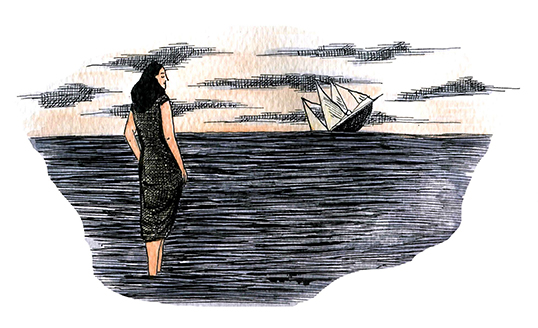Ubah Cristina Ali Farah is a poet, novelist, playwright, and oral performer of Italian and Somali heritage, best known for her novels Madre piccola (2007) and Il comandante del fiume (2014). Her piece, “A Dhow Crosses the Sea” recently appeared in the April issue of Asymptote, translated from the Italian by Hope Campbell Gustafson of the University of Iowa.
Claire Jacobson (CJ): What can you tell me about the oral storytelling quality of your work?
Ubah Cristina Ali Farah (UCAF): While I was studying at the Sapienza University of Rome, my favorite authors were Amos Tutuola, Amadou Hampâté Bâ and the great Brazilian writer, João Guimarães Rosa. I learned to love the oral, anonymous poetry of the medieval bards, the romancero evoked by García Lorca, Italo Calvino’s rewriting of traditional Italian tales, and Pierpaolo Pasolini’s striking collection of popular songs and poems. However, my first loves, the texts that influenced me most, were the Somali oral poems and tales, under the wings of which I grew up. I was looking for the oneiric feeling that resonated in the oral poetry, a text disconnected but at the same time coherent, a voice encompassing both colloquial and erudite styles and registers of language. A storytelling that could embody the throbbing power of the voice.
CJ: How did you decide to write in Italian rather than Somali? How does that influence the way you write?
UCAF: Not only is Italian my mother tongue (or the tongue of my mother), but also the language of my formal education. Somali was formally codified less than fifty years ago, and its most prestigious literary form is poetry, not prose. Once in Italy after fleeing Somalia, telling stories about Somalia was for me an act of reconciliation, a way to come to terms with a painful collective history. Bending Italian (my mother’s tongue, but also the very language of the colonizer) to the rhythms of Somali, I was trying to interlock the two countries’ histories, to put together two worlds that apparently were separated. The language we choose to write has a powerful political meaning.
CJ: Your piece “A Dhow Crosses the Sea” contains such strong imagery of the sea, of Mogadishu, and of the coasts. How do place and setting, as well as memory, factor into your writing?
UCAF: The sea, together with the memory of Mogadishu—the city where I grew up and that in fact does not exist anymore—has a deep influence on my writing. Memory must be contained and reworked and sublimated when you want to use it for artistic purposes. Memory, both collective and individual, is a powerful artistic means, this is why one of the primary sources of my writing was oral stories, whether collected, remembered or recreated.
CJ: You touch on the “two-fold tragedy” inflicted on the shores of Mogadishu—the irony being that the cause was “aid money [that] gave us a new port and a very modern automatic slaughterhouse,” ultimately bringing about destruction. How is that irony significant beyond these events?
UCAF: It is a criticism of the humanitarian aid system, of the latent potential for destruction inherent in good deeds. This is not the place to talk about it in detail. I’d only like to link the process to “the politics of ‘the new humanitarian order’” as defined by Mahmood Mamdani.
CJ: In your view, how does your work speak to the current international political climate and the “banned countries”?
UCAF: Considering literature as poiesis, I think that like any other art form its ultimate objective is to influence reality. I do not believe in art for its own sake. At the same time, when art is too explicitly political, it loses its evocative power and thus its most important end: appealing to emotions, imagination and empathy. [We achieve that by] telling local and intimate stories that have a universal meaning, trying to interpret everyday experience through a system of imagery deriving from areas behind everyday experience. However, imagery is a slipping entity—it has to do with our cultural background but also with the experiences we treasure.
Claire Jacobson is the Assistant Interviews Editor at Asymptote. She studies French literature at the University of Iowa, and translates from French and Arabic.
****
Read More from the Blog Archives:

